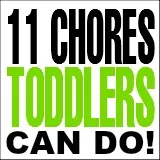You have most likely heard the term “terrible twos” when referring to toddlers. This description is fitting for all toddlers, but it is especially true if you have a strong-willed toddler. Having a strong-willed toddler isn’t a bad thing since you know that you’re raising a child who won’t be afraid to lead the way, but it can be a challenge. If you have a strong-willed toddler, these tips can help you handle discipline and structure without taking away your child’s independence.
Give Them a Choice
If you have a strong-willed toddler, then you know that the words, “Do this…” can result in a temper tantrum that can last for the entire morning. This is due to the fact that strong-willed children don’t appreciate being bossed around. They know what they want and aren’t afraid to let you know how they feel about it. To help your strong-willed toddler feel more involved in decision-making, give them two options they can choose from. For example, if you want your toddler to clean up some toys, you can say, “It’s time to clean up. Do you want to start cleaning in the living room or do you want to start in your bedroom?” This allows your strong-willed toddler to feel in control, all with the end result that you want.
Follow a Schedule
Consistency is key when it comes to handling a strong-willed toddler. That’s why it’s so important to follow a schedule. Set up a daily routine that includes meal times, naptime, playtime, and even clean-up time. Be sure to follow this routine each day, giving your toddler a heads up when something in the schedule is going to be changed. You should also give your toddler time warnings when it’s almost time to switch to the next thing. For example, if playtime is almost done and clean-up time is about to start, tell your toddler, “You have 5 more minutes to play and then we’re going to clean up.” This way, your toddler isn’t surprised when it’s time to switch, effectively reducing any fits they might have.
Have Set Consequences
If your strong-willed toddler refuses to do something, it’s important to have set consequences in place. Let your child know that if they don’t listen, they will have a 5 minute time-out or will lose a toy for a day. By having the consequence already in place, your toddler will know what to expect if they don’t listen or follow directions. They might still decide not to follow directions, but they won’t be surprised by the consequence, especially if you use the same consequence each time. Eventually, your toddler will follow your directions more often so that they can avoid the consequence.
Let Them Express Themselves
Oftentimes your strong-willed toddler will throw a fit if they feel as if they aren’t being heard or understood. If you see that your toddler is about to have a meltdown, sit down with them and give them the opportunity to express how they’re feeling and what they’re thinking. By giving your toddler a listening ear, you’re allowing them to express themselves in a constructive manner. This can help eliminate their frustration!
These tips are great for handling your strong-willed toddler without breaking their independence. What are some tips you have for handling strong-willed children?
You are also going to love:
If you liked this post, you will like these too!

Elizabeth Lampman is a coffee-fuelled Mom of 2 girls and lives in Hamilton, Ontario. She enjoys travelling, developing easy recipes, crafting, taking on diy projects, travelling and saving money!






Samantha T
Sunday 3rd of May 2020
Hey ELizabeth,
Great post! I have been reading so many blogs on this subject and this one's had some good points which I'd like to mention here. Strong-willed kids are very particular about fixed routine and they have a sharp memory too.
So, I believe being regular to them and following a strict schedule without a miss will make your life easy...
These lil munchkins are born leaders and they really going to make you proud.
Kori
Saturday 19th of October 2019
I had such a hard time during the 2&3s with my youngest. Sometimes I wasn't sure though if it was just her being a toddler or if it was amplified. Now, looking back, I can apply some of those things to where we are now. It's all about that consistency!
Melanie
Wednesday 11th of September 2019
I am a mother of a almost 3 year is. I tell people all of the time that she has been here before. LOL I thoroughly enjoyed the article and the tips you gave. My daughter is very strong will and does like to he heard. She also requires a lot of structure. Me as well. Thank you for sharing the tips!
Anne jackson
Sunday 29th of October 2017
I just read a book about kids who has a hard time to follow adults or other ppl period! I think the first Vers it says Let the kid decide what it what’s to do better! Kids can’t decide you have to lead them to the right direction and they need and want you as a parent to tell them what to do the are physically not grown enough to make decisions if they want to clean up there mess or if they want to go to bed or what they like better..... you will damage the kid leaving the decision on them. It will overwhelming them
Cori
Friday 13th of January 2017
As someone who has studied child development and works with under-twos every day, I have mixed feelings about this.
Consistency and choices are great, however, they should be applied to the task you're asking them to do. Ex. "Are you going to pick up the blue ball or the red car first?" "Should we clean up while listening to music, or no music?" Empower them. They want to do things their way, so why not let them make choices in their actions. If a toddler chooses not to do either action, then mommy/daddy/caregiver is going to help by doing hand over hand, hugging and talking it out, or by working together on the task ("I'm going to clean up the blue car. Which toy are you going to clean up? I'm glad you chose to help me.") Give acknowledgement when tasks are followed through with.
Toddlers do not understand "taking toys away for a day" because time is arbitrary. They're not so good with time outs because of this. Toddlers don't "think about their actions" like older children do because they are just starting to grasp that there are other people around them with feelings, too. They need someone who is calm and level headed to work them through their anger, and to label the things that they are feeling. At this age, they don't really understand that repeated actions cause consequences unless you label them each time.
Amy
Monday 29th of May 2017
As a child development expert, I agree with your mixed feelings about this blog. It is not going to help to put a young child in time out, especially for 5 minutes. Taking a toy away will not either. These actions are just showing your toddler that there is a power struggle and the adult is winning. As they grow, they will want to win. The best idea in this list is the last one. All behavior is the child having an unmet need. In toddlers, it is often the need to be understood. Giving your toddler your full attention, communicating at their developmental level , and explicitly stating why their idea (ie having ice cream for breakfast) isn't going to work is best. Then, find an alternative together, while giving your little one lots of love, understanding and affection.